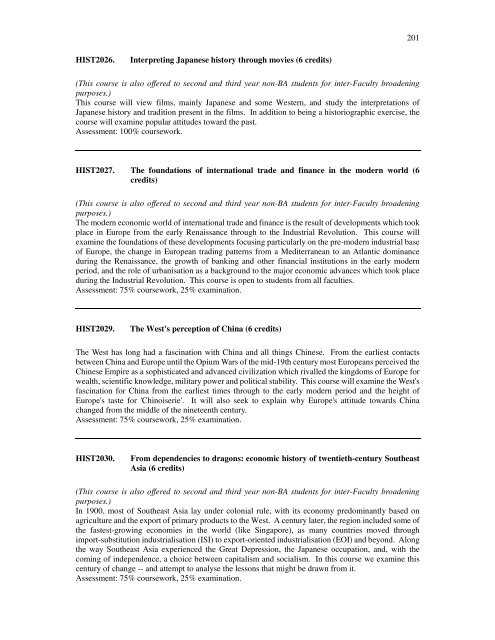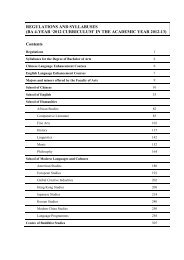Bachelor of Arts (BA) - The University of Hong Kong
Bachelor of Arts (BA) - The University of Hong Kong
Bachelor of Arts (BA) - The University of Hong Kong
Create successful ePaper yourself
Turn your PDF publications into a flip-book with our unique Google optimized e-Paper software.
201HIST2026.Interpreting Japanese history through movies (6 credits)(This course is also <strong>of</strong>fered to second and third year non-<strong>BA</strong> students for inter-Faculty broadeningpurposes.)This course will view films, mainly Japanese and some Western, and study the interpretations <strong>of</strong>Japanese history and tradition present in the films. In addition to being a historiographic exercise, thecourse will examine popular attitudes toward the past.Assessment: 100% coursework.HIST2027. <strong>The</strong> foundations <strong>of</strong> international trade and finance in the modern world (6credits)(This course is also <strong>of</strong>fered to second and third year non-<strong>BA</strong> students for inter-Faculty broadeningpurposes.)<strong>The</strong> modern economic world <strong>of</strong> international trade and finance is the result <strong>of</strong> developments which tookplace in Europe from the early Renaissance through to the Industrial Revolution. This course willexamine the foundations <strong>of</strong> these developments focusing particularly on the pre-modern industrial base<strong>of</strong> Europe, the change in European trading patterns from a Mediterranean to an Atlantic dominanceduring the Renaissance, the growth <strong>of</strong> banking and other financial institutions in the early modernperiod, and the role <strong>of</strong> urbanisation as a background to the major economic advances which took placeduring the Industrial Revolution. This course is open to students from all faculties.Assessment: 75% coursework, 25% examination.HIST2029.<strong>The</strong> West's perception <strong>of</strong> China (6 credits)<strong>The</strong> West has long had a fascination with China and all things Chinese. From the earliest contactsbetween China and Europe until the Opium Wars <strong>of</strong> the mid-19th century most Europeans perceived theChinese Empire as a sophisticated and advanced civilization which rivalled the kingdoms <strong>of</strong> Europe forwealth, scientific knowledge, military power and political stability. This course will examine the West'sfascination for China from the earliest times through to the early modern period and the height <strong>of</strong>Europe's taste for 'Chinoiserie'. It will also seek to explain why Europe's attitude towards Chinachanged from the middle <strong>of</strong> the nineteenth century.Assessment: 75% coursework, 25% examination.HIST2030.From dependencies to dragons: economic history <strong>of</strong> twentieth-century SoutheastAsia (6 credits)(This course is also <strong>of</strong>fered to second and third year non-<strong>BA</strong> students for inter-Faculty broadeningpurposes.)In 1900, most <strong>of</strong> Southeast Asia lay under colonial rule, with its economy predominantly based onagriculture and the export <strong>of</strong> primary products to the West. A century later, the region included some <strong>of</strong>the fastest-growing economies in the world (like Singapore), as many countries moved throughimport-substitution industrialisation (ISI) to export-oriented industrialisation (EOI) and beyond. Alongthe way Southeast Asia experienced the Great Depression, the Japanese occupation, and, with thecoming <strong>of</strong> independence, a choice between capitalism and socialism. In this course we examine thiscentury <strong>of</strong> change -- and attempt to analyse the lessons that might be drawn from it.Assessment: 75% coursework, 25% examination.
















